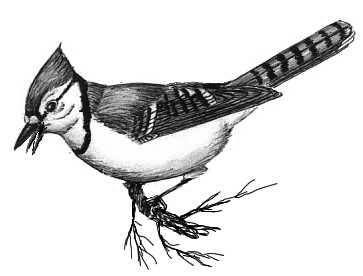
Dear Bird Folks,
What is going on with the blue jays? I haven’t seen much of them for the past few months and now they are hitting my feeder from all directions. Where have they been and why are they suddenly so hungry?
– Mandy, Chatham
Oh Mandy,
Aren’t blue jays the best? They are so handsome and rowdy. To me they always look like they are ready for a party or a fight, or both. Oops, sorry. What was your question again? Oh yeah, right, where have they been? They have been here on Cape Cod all along, they never leave, but they do get quiet. During the summer nesting season they are off being good parents and, like all parents, there is very little partying for them while they are raising their kids. Fortunately for blue jays, their kids are raised and out on ther own in a matter of months, then it’s back to party time.
Fall is when blue jays get back together in small flocks and look for food. Jays are one of the few birds that gather and store food. When they find a source of food, they load up by holding as much as they can carry in their throats. Jays don’t have real crops like chickens, but their throats are able to stretch a bit and that allows them to jam in a few extra sunflower seeds before they fly off. They might fly away to eat the seeds, but often in the fall, they stash the seeds in a tree cavity or bury them in the ground. The hidden seeds are sometimes eaten later when food is scarce, but many times they can’t remember where they have hidden the food (probably the result of too much partying). The undiscovered seeds and acorns then sprout into trees or other plants, thus making blue jays responsible for growing at least some of their own food.
Soon the fall gathering of food will slow down and the blue jays won’t be such pigs at your feeder. As winter sets in, the blue jay flocks break up and they will come less regularly to your feeder. Your feeder will then be attended by a more deserving visitor, like the gray squirrel.